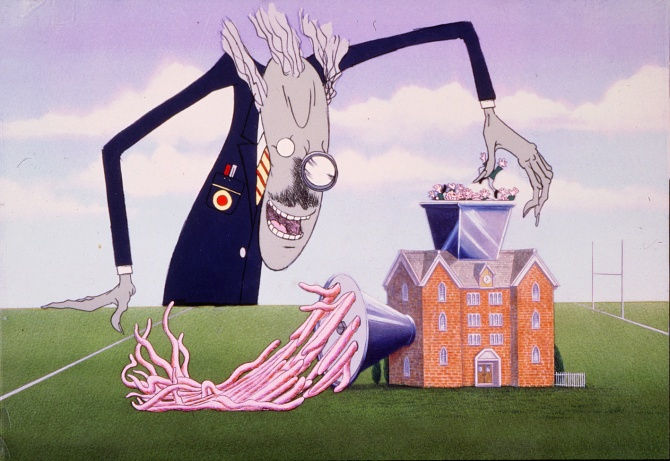by Paul Cudenec
A strange thought crept into my head a couple of days after finishing my last article, Fascism: Three Brief Insights.
There I had explained, yet again, that despite the name of their party, Hitler’s “National Socialists” were not really socialists at all, but tools of big business.
The “socialist” part of the label was just a way of grabbing votes, at a time in history when capitalism was badly viewed by most.
It suddenly struck me that it was perhaps not just the second half of the label which was misleading. If the Nazis were funded by American financial interests, as Antony C Sutton demonstrates, then could they really be said to be “national” either?
We have been brought up to regard Nazism as the ultimate historical reminder of the potential dangers of nationalism, so it may seem absurd to suggest that the Nazis were not really nationalists at all.
But the idea makes more sense if we understand that nationalism is, in any case, built on deception.

The idea of a “nation” is itself a construct, used to help justify the existence or potential existence of a state. This “nation” offers “inclusivity”, inviting people to identify with the state. The state is no longer regarded as “them”, the ruling class who really own and control it, but as “us”, the nation.
Nationalism as a political ideology is therefore, to some extent, the weaponisation of that manufactured “national” identification with the ruling class.
I say “to some extent” because there is another side to nationalism, a side which is easiest to see when we are talking about the independence-seeking kind of nationalism, rather than the dominating kind.
If we think about anti-imperialist Indian nationalists opposing the British Raj, or Basque nationalists fighting the Franco regime, or Algerian nationalists who struggled to free their country from French rule, we see different forces at play.
Here, nationalism is the expression of a need for freedom from external domination. It is the desire for self-determination.
This positive aspect can be found lurking somewhere in all forms of nationalism. The “Brexiteers” who oppose the influence of the EU, or the “US patriots” who decry the influence of global institutions, are likewise sourcing their fundamental political ethics from the idea of self-determination and a certain (albeit limited) decentralisation of power (from an international down to a national level).
In this guise, the national “we” is a call from below, a declaration of proud collective autonomy.

But because it has based itself on the manufactured concept of “nation”, rather than on the authentic principle of freedom, this creed will always remain stuck with the idea of top-down authority from its chosen platform of “the nation”.
When it comes to this particular level of control, nationalism abandons its calls for autonomy to rally behind the need to respect the rule of the nation-state.
Further decentralisation to regional and community level, which should in fact be the logical conclusion of its founding ethos of self-determination, is seen as a threat to the unity of the all-important “nation”.
People have a natural desire for a sense of collective belonging, for being a “we”, for wanting to protect their own community or tribe from outside danger, for wanting to decide among themselves how they should live, rather than being controlled and exploited by strangers.
But, thanks to the device of “the nation”, that desire is hijacked and diverted into enthusiastic support for the state and the ruling clique that uses the state to protect and expand its own wealth and power.
A love of one’s own culture, land and people is easily turned into a fear or hatred of others and thus the positive autonomy-seeking energy within the nationalist impulse is transformed into the toxic fuel for wars (which profit the ruling elite).
As a result, that original life-affirming energy is itself discredited, retrospectively, by the end result.
We fear that any talk of self-determination, or independence from international levels of authority, could be the slippery slope towards nationalist toxicity and war.

The “lesson” we learn from nationalism is therefore that it is dangerous to oppose centralised (international) power.
The underlying idea has been turned around to push our thinking in exactly the opposite direction to that of the initial driving force of decentralisation and self-determination.
The initial vital energy is betrayed twice. Firstly by diverting it into the dead-end of nationalism. Secondly by using that degraded version to discredit the original healthy impulse.
Here we can see how it can be possible for the Nazis to embrace superficial nationalism while effectively representing the inversion of its underlying principles, in that they were funded from abroad by the international ruling class. Nationalism was already a corrupted and deceptive ideology and the Nazis merely added an extra layer of lies.
The same thing is true of socialism and communism, in fact. The initial impulse of these movements was for freedom from the domination of the ruling elite. The collective identity in question here was one of class, rather than of nation, but there was still the idea of the “we”, the togetherness and solidarity in the face of oppression from above.
But, again, this life-affirming energy was captured and channelled by merging it with the idea of authority. Just as “the nation” was used to justify the existence of the state, socialism embraced the need for a “people’s state”.
The socialist or communist movement, whose driving force was to overturn the repressive structures of control and exploitation, was transformed into a dogma which calls for and defends those same structures (when they are labelled to its taste).

Furthermore, this distortion of socialism has secondary effects similar to those applying to nationalism.
We fear that any talk of “the people” or “equality” could be the slippery slope towards statist tyranny, towards regimentated uniformity imposed from above, towards a totalitarian system hiding behind a “left-wing” political label.
The “lesson” we learn from socialism and communism is therefore that it is dangerous to identify and oppose the power of the wealthy ruling class in the name of the people, as this might lead to “Stalinist” dictatorship.
Socialism has been turned around to push our thinking in exactly the opposite direction to that of the initial driving force of popular liberation.
The initial vital energy is betrayed twice. Firstly by diverting it into the dead-end of statism. Secondly by using that degraded version to discredit the original healthy impulse.
As a third example of the same process, let’s consider the political movement today known as “environmentalism”.
The original feeling behind this was, obviously, a love of nature and a desire to defend it from assault by the industrial system. The “we” in this case was not the “nation” or the “people” but the Earth and all that lives on it.

But, once again, this life-affirming energy was captured and channelled by merging it with the idea of authority. Eco-rebellion was transformed into calls for the state to take on more power (“it’s an emergency!“) and to pour more public money into the pockets of the sustainably-wealthy elites and their phoney (industrialist) “solutions”.
Needless to say, this distortion of environmentalism has secondary effects similar to those applying to nationalism and socialism.
People increasingly equate the term with central state-corporate control, with a self-righteous and hypocritical outlook which imposes the blame for industrial pollution on ordinary people and manipulates the environmental crisis to exploit and restrict them.
The “lesson” we learn from environmentalism is therefore that we are being lied to for ulterior motives and that anyone voicing “green” views is most likely a fake, an enemy of the common people and a representative of the power elite. From this perspective, freedom is tied to the right to carry on shopping, driving cars, taking low-cost flights and so on.
In this way, environmentalism has been turned around to push many people’s thinking in exactly the opposite direction to that of the initial driving force of opposing industrialism.
The initial vital energy is betrayed twice. Firstly by diverting it into the dead-end of corporate greenwashing. Secondly by using that degraded version to discredit the original healthy impulse.
Although I have recently been focusing on the fascist character of contemporary society, particularly obvious since March 2020, there are clearly deeper elements at play here.

Fascism, like state socialism and pseudo-environmentalism, is just one manifestation of something else, something nasty which lurks beneath the surface of our usual political reality and terminology.
There is an underlying force which created and maintains the corrupt contemporary system.
This “something” could be described as power, or the thirst for power.
It is the sadistic urge to dominate, the grasping and selfish impulse to own, consume and grow fat at the expense of others, the cruel delight in laughing in the faces of its victims.
It is a poison in the human body which has spread so widely that it risks killing us all.
It oozes sheer malignancy, it revels in war and ugliness and destruction.
It is the contradiction of the life force, a cult of sterility, artifice and death.
This “something” steals our deepest-felt desires, as we have seen, and twists them into weapons for its own defence.
Its lies form a maze of misleading mirrors which we have to shatter if we are to reclaim everything that makes us free and happy and whole.